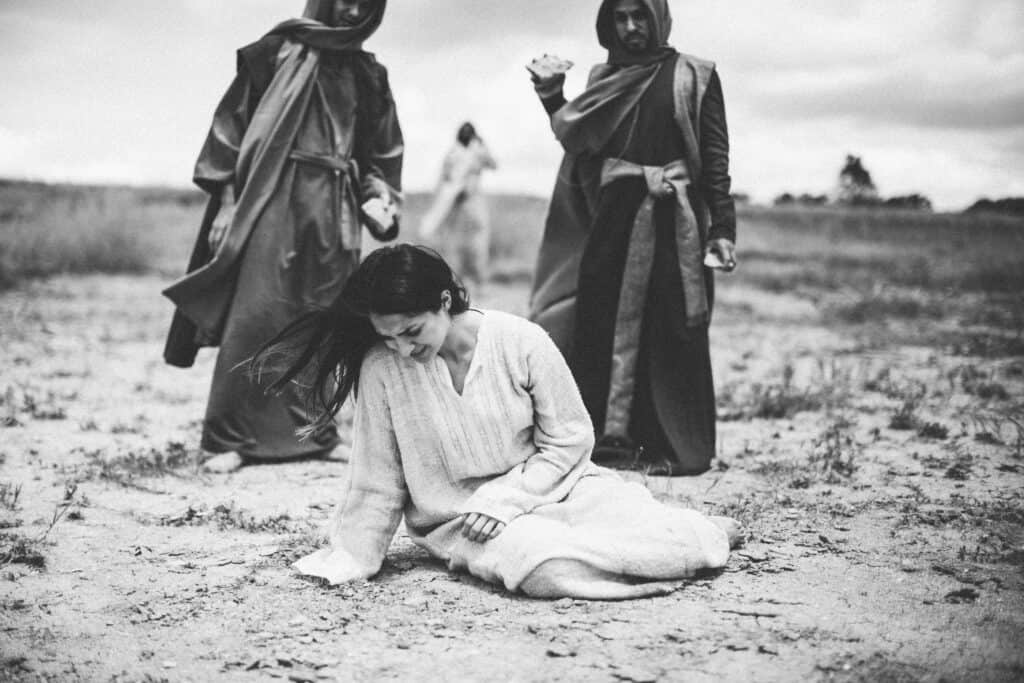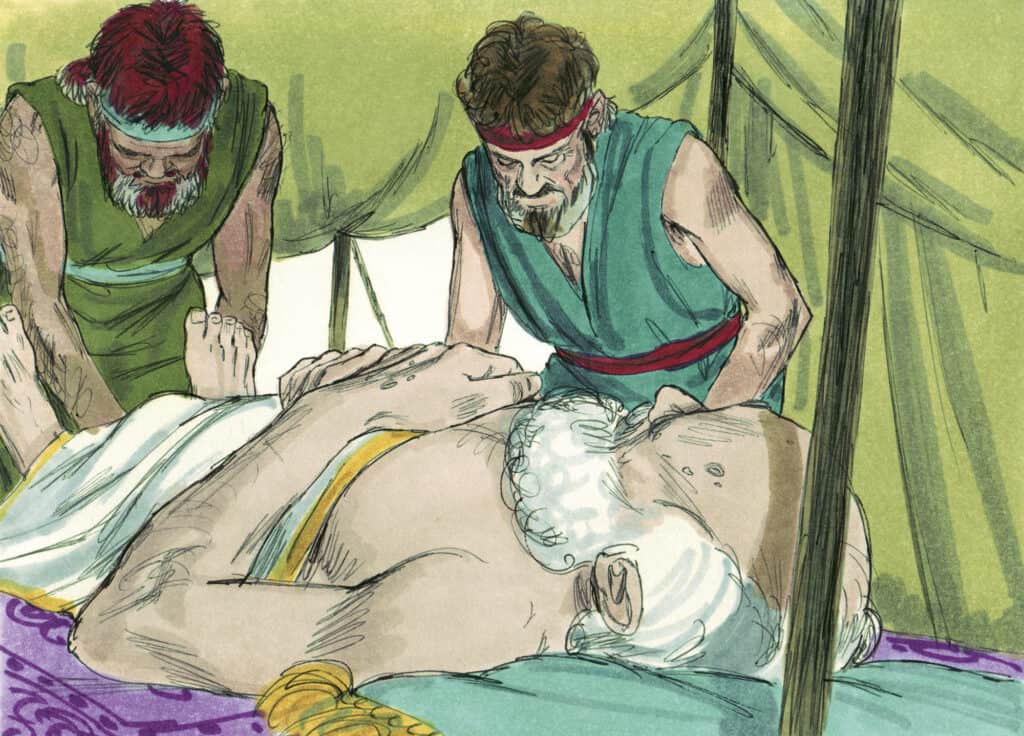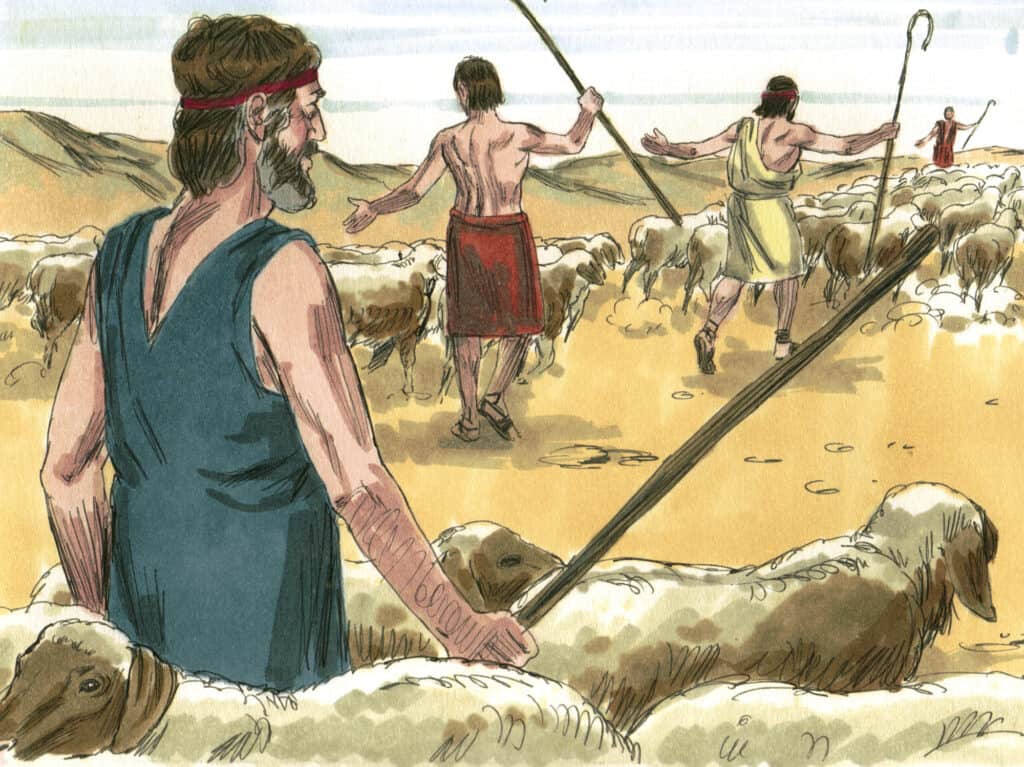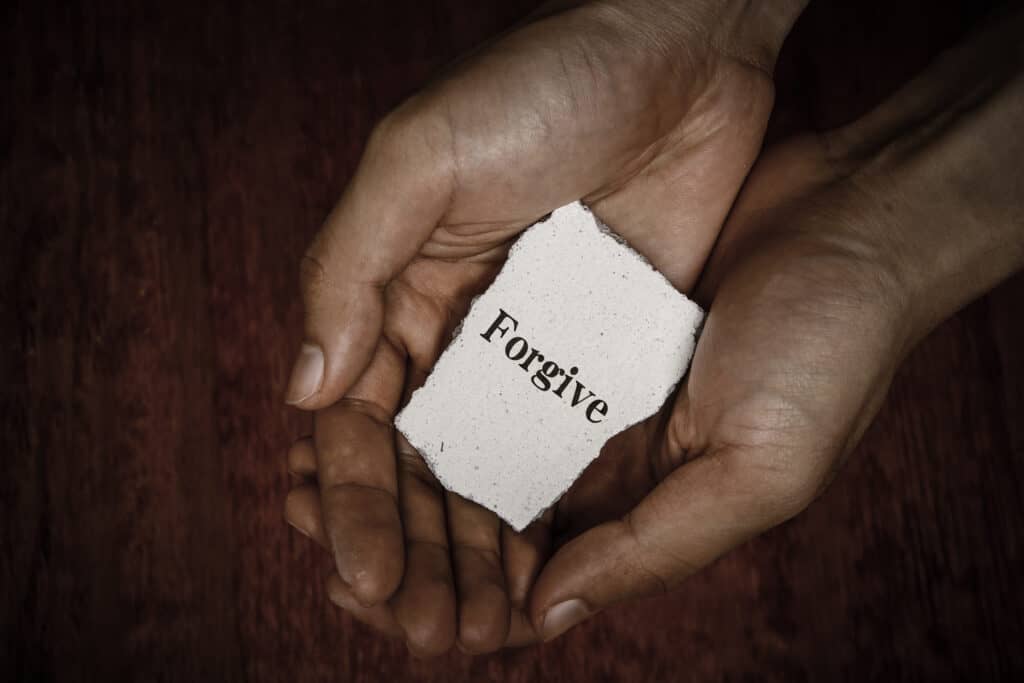
Forgiveness—is it ever easy?
Looking through the history of humanity, we see that forgiveness has always been a challenging process. But it also proves to be worth it.
And the Bible provides several profound examples of just how powerful it can be. Even with thousands of years between us and these stories, chances are we can relate to several of them.
We’ll look at the highlights of these stories:
- Adam and Eve
- The woman brought before Jesus
- Moses and the rock
- Joseph’s family reunion
- Jacob and Esau
- Jacob and Laban
- Jonah, the stubborn prophet
- David and King Saul
- King David gets called out
- The “Prodigal Son” parable
- The stoning of Stephen
- Saul becomes Paul
- Philemon and Onesimus
- The “Unmerciful Servant” parable
- Jesus—the ultimate forgiveness story
First, we’ll go all the way back to Genesis.
Adam and Eve, and the intro to forgiveness
When God created our world, He said it was “very good” (Genesis 1:31, NKJV). The animals were perfectly friendly, Adam and Eve had a wonderful relationship…life was incredible.
Enter the serpent, intent to cast doubt about God. The serpent asked Eve, “Has God indeed said, ‘You shall not eat of every tree of the garden’?” (Genesis 3:1, NKJV)
Eve replied that she could eat fruit from any tree—except this one.
But Satan, talking through the serpent, convinced Eve that the reason they weren’t to eat the fruit was because they’d become like God.
Your eyes will be opened, and you will be like God, knowing good and evil
Genesis 3:5, NKJV
Eve tried the fruit, then Adam ate some. When God came by to visit, they felt immediate vulnerability. So they hid.
But despite the pivotal choice they had made, God promised deliverance.
And this deliverance would cost Him everything.
Yet, His love for humanity gave Him reason to forgive and to deliver.
God so loved the world that He gave His only begotten Son, that whoever believes in Him should not perish but have everlasting life
John 3:16, NKJV
God’s Son, Jesus, would come to save us. He would offer forgiveness and healing.
With Adam and Eve’s choice to see what a world of both good and evil is like, sin and the need for forgiveness entered into our existence. We have all experienced the need to be forgiven, and we have also been faced with opportunities to forgive.
In the once-perfect garden, now marred by sin, God set up the plan of forgiveness, of redemption, of unconditional love. From the Garden of Eden, we have the promise of restoration and healing.
Jesus’ whole life was one of forgiveness. One incident that illustrates this clearly is the story of the woman who was thrown at His feet—the woman caught in adultery.
“Neither do I condemn you”

She knew she shouldn’t be selling her body. She knew if she was caught, the punishment was stoning (John 8:5). Yet, she persisted.
Was she alone and desperate? Did she need money? Was she searching for love? Was she being forced?
We may never know the answers to these questions. We only have the response of Jesus to this unfortunate situation.
Jesus was creating quite a stir during His ministry on earth. His teachings were revolutionary. And this was in the face of the rigid teachings of the current religious leaders, who now realized they were losing their authoritative grip on the people.
So they tried to stop Jesus. If they could trap Him in an appearance of law-breaking, they could get the Roman government involved. And if the Romans suspected insurrection, it would be a death sentence.
So when Jesus was teaching some people out in the open, the religious leaders stormed onto the scene, dragging a woman with them. They dropped her right in front of Jesus.
Teacher, this woman was caught in adultery, in the very act. Now Moses, in the law, commanded us that such should be stoned. But what do You say?
John 8:4–5, NKJV
Instead of confronting the situation as they wanted Him to, Jesus appeared to ignore it. He stooped down and started writing in the dirt. Infuriated, the religious leaders drew close. What could possibly be more important than answering their question?
When they looked at what was written, they were horrified. The Bible says they were “convicted by their conscience.” They “went out one by one, beginning with the oldest even to the last” (John 8:9, NKJV).
What secrets did Jesus pencil into the dirt? What did they read that caused them to give up all hope of trapping Jesus?
Then He looked up. He and the woman were alone.
Woman, where are those accusers of yours? Has no one condemned you?
John 8:10, NKJV
No one, Lord
John 8:11, NKJV
Neither do I condemn you; go and sin no more
John 8:11, NKJV
Here we see Jesus offered both forgiveness and healing. He gave her a chance for a new start. While He certainly disapproved of adultery, He also most definitely disapproved of humiliating someone for selfish gain.
We also see the mercy of God in His treatment of the religious leaders. He didn’t write His message in stone so that future generations could read whatever it was that embarrassed those men. He wrote it in the dust. In just a few moments, the record was erased—removed by the wind.
Forgiveness is an incredible gift.
But does forgiveness remove the consequences of our actions? Is it possible to be completely forgiven by God and still have to deal with the results of what we’ve done?
Let’s see what the story of Moses tells us.
When Moses failed to follow directions
Moses was appointed by God to lead the children of Israel out of Egypt and into the Promised Land.
And it’s not surprising how difficult that was. The Israelites were immature, superstitious, and hesitant to trust authority.
If they got scared, they complained. If they ran out of water, they complained. If they got bored with their food, they complained. It’s no wonder Moses’ patience was tried.
When they yet again ran low on water, you can guess how they approached Moses. So Moses and Aaron prayed, asking God what to do. He answered:
Take the rod; you and your brother Aaron gather the congregation together. Speak to the rock before their eyes, and it will yield its water; thus you shall bring water for them out of the rock, and give drink to the congregation and their animals
Numbers 20:8, NKJV
Moses took his rod in hand, like God said. But he didn’t speak to the rock—he spoke to the people:

Hear now, you rebels! Must we bring water for you out of this rock?
Numbers 20:10, NKJV
The next verse tells us, “Moses lifted his hand and struck the rock twice with his rod; and water came out abundantly, and the congregation and their animals drank” (Numbers 20:11, NKJV).
The desired result was reached, but Moses neglected to follow the very clear instructions to “speak to the rock” (Numbers 20:8, NKJV). And what he said almost sounded like he was taking the glory for himself, saying, “Must we bring water for you…”
So God addressed Moses:
Because you did not believe Me, to hallow Me in the eyes of the children of Israel, therefore you shall not bring this assembly into the land which I have given them
Numbers 20:12, NKJV
God certainly loved Moses and acknowledged how he served Him. But He couldn’t allow Moses’ anger, which he expressed publicly and pridefully while in a position of authority, to go without consequences.
Imagine how hard this had to be. Moses had been leading the children of Israel for many years. Now, because of his choice, he must forfeit the joy of guiding them into the Promised Land.
Would God forgive him? Absolutely. Would God remove the consequences? No.
Moses continued to faithfully serve the children of Israel, even though he didn’t get to lead them into the Promised Land.
And just like God loved Moses, He loves us immeasurably. He forgives us, even though our consequences may remain. And He promises to journey with us through all our trials.
In our relationships, it is important to differentiate between forgiveness and consequences. Even though we forgive someone, it doesn’t mean that we don’t hold them accountable.
One Bible story that illustrates this is the story of Joseph.
Joseph: a favored son, a victim of jealousy
It was no secret—Joseph was the favorite of Jacob’s twelve sons (Genesis 37:3). And as expected, this didn’t sit well with Joseph’s eleven brothers.
It bothered them so much that they plotted a way to fake his death and drive him away. So when Jacob asked him to go check on his brothers in the field one day, they took the opportunity to rough him up, throw him in a pit, and later sell him to traveling slave traders (Genesis 37:24–27).
Joseph ended up in Egypt, first as a slave in Potiphar’s house, then in jail for a crime he didn’t commit. While in prison, his name came up when Pharaoh had a dream that troubled him. Joseph prayed to God to interpret the dream, and Pharaoh pardoned him.
So Joseph ended up going from prison to an esteemed position in the palace. And when Pharaoh praised his ability at explaining the dream, Joseph replied: “It is not in me; God will give Pharaoh an answer of peace” (Genesis 41:16, NKJV).
Pharaoh’s dream foretold of a coming famine. Joseph advised storing up provisions ahead of time, so Pharaoh put him in charge of that.
You shall be over my house,” said Pharaoh. “All my people shall be ruled according to your word; only in regard to the throne will I be greater than you
Genesis 41:40, NKJV
And during the famine, Egypt had reserves of food. People from all over the area came to Egypt to buy grain. This included Joseph’s brothers.
They didn’t recognize him because he looked like an Egyptian—and he was probably the last person they’d expect to see in that position.
But Joseph was blindsided. We can only imagine how overwhelmed and emotional that moment was for him (Genesis 42:24).
He wanted to reconnect, but he wasn’t sure it was safe. So he tested the waters.
He asked them to present their whole family and to demonstrate their honesty by returning an Egyptian valuable that was planted in one of the sacks of grain they bought.
As he saw their reactions, he realized they had indeed changed. They wouldn’t hurt him now.
Finally, he revealed himself. “I am Joseph; does my father still live?” (Genesis 45:3, NKJV)
They were shaking. They knew what they deserved and that Joseph was in a position to enact revenge. But they were in for yet another surprise.
Do not therefore be grieved or angry with yourselves because you sold me here,” Joseph told them. “God sent me before you to preserve life
Genesis 45:5, NKJV
It had been many years, and Joseph had forgiven his brothers. But instead of trying to get even or make them feel some of his pain, Joseph invited them to live in Egypt.
So even though Joseph was hurt more deeply than most of us can even imagine, he was able to forgive. God was strengthening him the whole time. And since Joseph was faithful and obedient, God provided for him and even rewarded him with a high position.
Joseph said to them, Do not be afraid, for am I in the place of God? But as for you, you meant evil against me; but God meant it for good, in order to bring it about as it is this day, to save many people alive. Now therefore, do not be afraid; I will provide for you and your little ones.’ And he comforted them and spoke kindly to them
Genesis 50:19–21, NKJV
To forgive is to let go of the desire to see someone else hurt. Forgiveness frees our minds to focus on God’s goodness instead of our pain.

But what if there’s continual dysfunction? What if someone keeps trying to hurt us? Are we required to stay in that type of situation? Let’s look at the story of Joseph’s father, Jacob.
Jacob and Esau: brothers at odds

Jacob was the second-born of twins. So his brother, Esau, got all the perks of being the firstborn. Esau was entitled to birthright blessings such as land, riches, honor, and spiritual leadership.
Jacob desperately wanted the birthright. After all, Esau didn’t seem to care much about most of it. He was a hunter and a fighter, and he didn’t seem interested in being a spiritual leader. But Jacob did. And he must have felt like he deserved it since his mother, Rebekah, thought so too (Genesis 25:28).
One day, Jacob saw his chance at taking the birthright. He would approach Esau at his weakest and coerce him to “sell” it to him.
He waited until “Esau came in from the field, and he was weary” (Genesis 25:29, NKJV).
And Jacob just happened to have food prepared for this moment. Esau asked for some.
Jacob responded, “Sell me your birthright as of this day” (Genesis 25:31, NKJV). Esau, a bit dramatically, said, “Look, I am about to die; so what is this birthright to me?” (Genesis 25:32, NKJV)
So this “transaction” took place, but Isaac, their father, didn’t get the memo. So when Isaac was old and frail and about to die, he summoned Esau to give him the birthright blessing.
When Rebekah heard this, she conspired with Jacob. They knew Isaac’s eyesight was bad. So Jacob was to pose as Esau, wear his clothes, run to Isaac before Esau arrived, and get Isaac to bless him instead.
And Jacob succeeded. But just minutes after, Esau arrived.
Both father and eldest son were horrified at the deception that had played out only moments before.
“I will kill my brother Jacob,” Esau declared (Genesis 27:41, NKJV).

So Jacob ran away. He went to live with and work for his uncle Laban.
Esau continued to live close to home and harbored a grudge that only grew with time.
And before we find out what happened with these brothers, another forgiveness story begins within this one.
Jacob and Laban

Laban, a wealthy cattle owner, employed Jacob in return for food and shelter. After a while, he asked Jacob, “Because you are my relative, should you therefore serve me for nothing? Tell me, what should your wages be?” (Genesis 29:15, NKJV).
It turned out that there was indeed something Jacob wanted. He’d fallen in love with Rachel, Laban’s daughter.
I will serve you seven years for Rachel, your younger daughter
Genesis 29:18, NKJV
At the end of seven years, Laban threw a marriage celebration, and Jacob and Rachel were married. At least, that’s what Jacob thought.
It came to pass in the morning, that behold, it was Leah. And he said to Laban, ‘What is this you have done to me? Was it not for Rachel that I served you? Why then have you deceived me?
Genesis 29:25, NKJV
Laban explained that his older daughter had to be married before his younger daughter. He told Jacob that he could marry Rachel as well…and work another seven years for her. So he did.
And even after those seven years, he continued to help Laban until he felt it appropriate to establish his own household separately.
Send me away,” Jacob requested, “that I may go to my own place and to my country. Give me my wives and my children for whom I have served you, and let me go; for you know my service which I have done for you
Genesis 30:25–26, NKJV
But Laban didn’t want him to go. He was a good worker, and he was making Laban more profitable (Genesis 30:27).
So Jacob stayed. Laban paid Jacob in animals, and over time Jacob became wealthy—enough that Laban’s sons became resentful. And soon, so did Laban himself (Genesis 31:1–2).
God warned Jacob it was time to leave.
Then the LORD said to Jacob, ‘Return to the land of your fathers and to your family, and I will be with you
So Jacob and his family left, but without telling Laban. A few days later, however, Laban caught up with the caravan.
Why did you flee away secretly, and steal away from me, and not tell me?
Genesis 31:27, NKJV
Now Jacob felt he could really speak his mind, telling Laban that his treatment of him was unfair and inconsiderate.
He also admitted that they left secretly because Jacob was “afraid, for I said, ‘Perhaps you would take your daughters from me by force’” (Genesis 31:31, NKJV).
But after laying everything out in the open, Laban and Jacob ended up parting amicably.
“Jacob took a stone and set it up as a pillar” (Genesis 31:45, NKJV). Laban said, “May the LORD watch between you and me when we are absent one from another”
Genesis 31:49, NKJV
Jacob indeed resented the way Laban treated him. However, he no longer wanted to subject himself or his family to the situation. And he needed to put it behind him so the resentment wouldn’t continue to fester.
Sometimes, the best approach to a bad situation is distance. Boundaries are always important and should always be respected.
Forgiveness is different from allowing someone to take advantage of us. We can forgive them and still maintain distance—even if they’re our own family members.

And now we get back to the earlier situation with Jacob, as he and his family drew closer to his old home.
What type of reception awaited them?
Jacob and Esau reconcile
As Jacob got nearer to his home, he decided to try sending a message to Esau. He sent messengers ahead with gifts and these words:
Thus your servant Jacob says: ‘I have dwelt with Laban and stayed there until now. I have oxen, donkeys, flocks, and male and female servants; and I have sent to tell my lord, that I may find favor in your sight
Genesis 32:4–5, NKJV
Instead of delivering the message, the messengers came back. “We came to your brother Esau, and he also is coming to meet you, and four hundred men are with him,” they told Jacob (Genesis 32:6, NKJV).
As he got close to Esau and his four hundred men, he bowed himself to the ground seven times. And then he was probably flabbergasted at the greeting he received.
Esau ran to meet him, and embraced him, and fell on his neck and kissed him, and they wept
Genesis 33:4, NKJV
This has to be one of the most beautiful moments of forgiveness. It was clear Jacob was remorseful, and it was clear Esau was ready to put everything behind them. Their brotherly bond was to get priority now.
Esau even turned down Jacob’s gifts!
I have enough, my brother; keep what you have for yourself
Genesis 33:9, NKJV
No, please,” Jacob said, “if I have now found favor in your sight, then receive my present from my hand, inasmuch as I have seen your face as though I had seen the face of God, and you were pleased with me
Genesis 33:10, NKJV
Jacob’s poetic words help us understand how beautiful forgiveness can be. Dropping the pain and letting it go. Appreciating the relationship now restored.
If we don’t have a forgiving spirit, we can miss out on that beauty.
Here’s a story about someone who refused to forgive.
Want to learn more about how forgiveness is integral to God’s plan of salvation? Start your own online Bible study.
Jonah, the stubborn prophet
God asked Jonah to go to Nineveh and warn the people that their wickedness was out of control and that He was going to have to step in if things didn’t stop.
When Jonah heard of his assignment, he refused. He got on a ship sailing far away, thinking he could escape from God (Jonah 1:3).
The LORD sent out a great wind on the sea, and there was a mighty tempest on the sea, so that the ship was about to be broken up
Jonah 1:4, NKJV
The sailors were frightened, and eventually, Jonah confessed to them what was happening. This was the result of him running from his responsibility to God. He even told them to throw him overboard.

Pick me up and throw me into the sea; then the sea will become calm for you. For I know that this great tempest is because of me
Jonah 1:12, NKJV
Immediately, the storm subsided. But God wasn’t done with Jonah.
The LORD had prepared a great fish to swallow Jonah. And Jonah was in the belly of the fish three days and three nights
Jonah 1:17, NKJV
This was a time of prayer and heart-searching for Jonah. You can read his prayer in Jonah chapter 2.
After the fish spit him out, Jonah became determined to fulfill his mission. He went to Nineveh, armed with the message from God, and preached it with fervor.
And this powerful preaching, by the grace of God, did its job!
Instead of rejecting the message, the people of Nineveh agreed to change. They confessed their sins and turned to God.
God saw their works, that they turned from their evil way; and God relented from the disaster that He had said He would bring upon them, and He did not do it
Jonah 3:10, NKJV
That’s wonderful! Right?
Well, Jonah didn’t think so.
After all the trouble this “assignment” and this town had given him, he wanted to see their punishment delivered.
It displeased Jonah exceedingly, and he became angry
Jonah 4:1, NKJV
about him—not about wanting people to live. He even went so far as to ask God to just let him die.
Instead of letting him die, God prepared a plant to give him shade from the hot sun. But then…
God prepared a worm, and it so damaged the plant that it withered
Jonah 4:7, NKJV
Jonah’s anger was rekindled. Again, he asked God to let him die.
God asked Jonah, “Is it right for you to be angry about the plant?” (Jonah 4:9, NKJV)
He said, “It is right for me to be angry, even to death!” (Jonah 4:9, NKJV)
God brought the truth home in His next question.
You have had pity on the plant for which you have not labored, nor made it grow, which came up in a night and perished in a night. And should I not pity Nineveh, that great city, in which are more than one hundred and twenty thousand persons who cannot discern between their right hand and their left—and much livestock?
Jonah 4:10–11, NKJV
God’s forgiveness is full and free and available. He wants everyone to have a chance to make things right.
It’s true, sometimes it can be hard to see that a person who hurt us has changed their ways. Sometimes it can feel like they didn’t “pay” enough for what they did. But if we keep bitterness and anger inside of us, or when we let our own pride get in the way, we’re only hurting ourselves.
God wants us to forgive because we need to heal—so we can experience freedom in His love.
But hatred and jealousy are tough to deal with. That’s why we need God’s help.
David and King Saul
The story of David and Goliath is one of the most well-known in the whole Bible (1 Samuel 17). David, a shepherd boy, brought food to his older brothers on the battlefield and heard a Philistine champion, a giant man named Goliath, taunting Israel and making fun of God.
David couldn’t stand to hear God being mocked. And he was shocked to see the armies of Israel unwilling to fight Goliath. He volunteered to fight with God’s help, using the only tools he knew—his sling and some rocks.
And what followed was a miracle. God helped David take down Goliath. He was an instant celebrity to everyone.
Except for King Saul. He grew to despise David and tried to kill him twice (1 Samuel 18:11).
Through the next few chapters, the Bible records Saul’s animosity toward David. And in 1 Samuel 24, things take an interesting turn.
David and his men hid in a cave to avoid Saul. Not knowing they were there, Saul and his men camped out in the same cave to get some sleep!
David’s men urged him to kill Saul, but David refused.
The LORD forbid that I should do this thing to my master, the LORD’s anointed, to stretch out my hand against him, seeing he is the anointed of the LORD
1 Samuel 24:6, NKJV
But David did get close enough to cut off a corner of Saul’s robe. So when Saul woke up and left the cave, David went out to him.
See the corner of your robe in my hand! For in that I cut off the corner of your robe, and did not kill you, know and see that there is neither evil nor rebellion in my hand, and I have not sinned against you. Yet you hunt my life to take it
1 Samuel 24:11, NKJV
Saul was astonished and immediately humbled. He admitted that he knew David would be the next king of Israel.
But despite Saul’s words of reconciliation, David didn’t join him at the palace. Instead, “Saul went home, but David and his men went up to the stronghold” (1 Samuel 24:22, NKJV).
David’s choice to not kill Saul shows that he’d forgiven him.
However, his decision to not go to the palace with him shows that he knew he still had to be careful.
Forgiveness doesn’t mean putting yourself back into an abusive situation. It helps you to let go of the hatred and bitterness, but it doesn’t mean opening the door to be hurt again.

Now let’s look at what happens when even those we consider to be the “best” of people need forgiveness.
David and Bathsheba
As heroic as David was when he battled Goliath and faced Saul, he still made choices that brought about awful consequences and required God’s intervention and forgiveness.
David had become king. And one day, he began lusting after a woman named Bathsheba. He found out that she was the wife of Uriah, a brave soldier in his army.
Instead of keeping himself in check and respecting Uriah, David sent for Bathsheba. For one night. And then sent her home the next day.
And David thought their guilty secret would remain just that—a secret.
But within a few weeks, Bathsheba sent David a message, “I am with child“ (2 Samuel 11:5, NKJV).
Thinking quickly, David brought Uriah home from the battle. This will solve everything, he probably thought. He can spend the night with his wife, and no one will ever know that the child is mine.
But Uriah was too honorable a soldier to enjoy a time of leave while his fellow soldiers were fighting for their lives. Uriah told the king, “My lord Joab and the servants of my lord are encamped in the open fields. Shall I then go to my house to eat and drink, and to lie with my wife? As you live, and as your soul lives, I will not do this thing” (2 Samuel 11:11, NKJV).
Instead of confessing and facing the consequences, David started acting out of desperation. He ended up ordering Uriah to be placed in the thick of the fighting. Then the other soldiers were ordered to pull back. And Uriah died fighting for the king that slept with his wife.
Then God sent Nathan the prophet to David. No more silence—David was about to be called out and to have to answer to God for these terrible injustices.
Confronted with the enormity of what he did, David begged God for forgiveness.
His confession is recorded in Psalm 51. He pleaded with God, “Wash me thoroughly from my iniquity, and cleanse me from my sin…. Create in me a clean heart, O God, and renew a steadfast spirit within me” (verses 2, 10, NKJV)
There is never a sin too dark for God to forgive. He invites us to ask for His forgiveness, and “He is faithful and just to forgive us our sins and to cleanse us from all unrighteousness” (1 John 1:9, NKJV).

But what if we turn from God? If we pledge to follow Him and then walk away, is there still hope?
The “Prodigal Son” parable: love without condition
Jesus told a parable of a wealthy father and two sons.
These boys had grown up working hard on the family farm. Both were given all that the father could provide, and they were expected to maintain the property.
One day, the younger brother had enough. He was tired of working and wanted to enjoy life.
Father, give me the portion of goods that falls to me
Luke 15:12, NKJV
This son wanted his inheritance right away—he didn’t want to wait for his dad to die. The father agreed.
The younger son then left home, frivolously spending all the money.
But not long after, what seemed like an infinite amount of riches was all used up. And as luck would have it, that’s also when “there arose a severe famine in that land” (Luke 15:14, NKJV).
He tried to find work and ended up in a field, feeding pigs. He was so hungry that he almost ate the pig slop.
Then a thought came to him: “How many of my father’s hired servants have bread enough and to spare, and I perish with hunger!” (Luke 15:17, NKJV).
He decided to return home and plead, “Father, I have sinned against heaven and before you, and I am no longer worthy to be called your son. Make me like one of your hired servants” (Luke 15:18–19, NKJV).
But as he drew close to home, he looked up to see his father running toward him, arms outstretched in welcome (Luke 15:20).
He started his prepared speech, “Father, I have sinned against heaven and in your sight, and am no longer worthy to be called your son” (Luke 15:21, NKJV), but his father stopped him mid-sentence.
The father said to his servants, ‘Bring out the best robe and put it on him, and put a ring on his hand and sandals on his feet. And bring the fatted calf here and kill it, and let us eat and be merry; for this my son was dead and is alive again; he was lost and is found.’ And they began to be merry
Luke 15:22–24, NKJV
Just like the father in this story, God rejoices over us when we come back to Him. “There is joy in the presence of the angels of God over one sinner who repents” (Luke 15:10, NKJV).
Each one of us is important to God beyond measure. We are His loving creations. No matter what we’ve done, nothing could keep God from wanting us back with Him.

We can see another glimpse of that unconditional love for every human in the story of Stephen.
Stephen forgives his killers
Stephen was a deacon in the newly established Christian church we can read about in the book of Acts.
Stephen is described as “a man full of faith and the Holy Spirit” (Acts 6:5, NKJV). He preached with power and “did great wonders and signs among the people” (Acts 6:8, NKJV).
The religious leaders that opposed Jesus and His believers wanted to stop Stephen’s influence. So they brought him to their council and asked, “Are these things so?” (Acts 7:1, NKJV)
Stephen presented an amazing sermon you can read in Acts 7. By the time he was done tracing the line of biblical truth all the way from Abraham to the present day, the leaders were “cut to the heart” (Acts 7:54, NKJV).
But instead of seeing the truth, the religious leaders chose to destroy the messenger.
They cried out with a loud voice, stopped their ears, and ran at him with one accord; and they cast him out of the city and stoned him
Acts 7:57–58, NKJV

While they were stoning him, they “laid down their clothes at the feet of a young man named Saul” (Acts 7:58, NKJV).
And Stephen was praying. He “cried out with a loud voice, ‘Lord, do not hold this sin against them’” (Acts 7:60, NKJV).
Instead of being angry with the people who were stoning him, Stephen saw them as lost souls that needed God’s forgiveness and healing. He prayed for forgiveness for those who were killing him! What an amazing testimony.
But now, let’s shift gears and talk about another name we saw in that story: Saul, who would become Paul.
Saul/Paul, redeemed and transformed through forgiveness
Saul, the one who watched the coats at Stephen’s stoning, was a fervent persecutor. The book of Acts states simply, “As for Saul, he made havoc of the church, entering every house, and dragging off men and women, committing them to prison” (Acts 8:3, NKJV).
He was aligned with the sentiment of the religious leaders who opposed Jesus and did everything to destroy Christianity. But while traveling to Damascus, hunting down more of these believers, he was stopped in his tracks as “a light shone around him from heaven” (Acts 9:3, NKJV).
A voice spoke, “Saul, Saul, why are you persecuting Me?” (Acts 9:4, NKJV)
Saul must have had some idea of who he was addressing, because he asked, “Who are You, Lord?” (Acts 9:5, NKJV)
I am Jesus, whom you are persecuting
Acts 9:5, NKJV
Through this incident, a powerful persecutor turned into a champion of truth. Saul, with his name changed to Paul, left his old ways behind and lived on the road, preaching and teaching about the very Jesus he used to oppose.
Paul’s life and writings have since touched countless people, leading them to a relationship with Jesus Christ.
God doesn’t give up on anyone!
But how does forgiveness work when someone has wronged us, and they have no way of making it right? Even if they apologize, their actions might have caused irreparable damage. Paul was involved in one of these situations—the story of Onesimus and Philemon.
Onesimus and Philemon: from slave to brother
In the short book of Philemon, Paul wrote a letter to one of his good friends. Philemon had a slave, Onesimus, that ran away. For some reason, Onesimus fled to the city where Paul was imprisoned. Paul and Onesimus became friends.
As disobedient and difficult as Onesimus had been, Paul saw something in him. So he wrote to Philemon, “I appeal to you for my son Onesimus, whom I have begotten while in my chains, who once was unprofitable to you, but now is profitable to you and to me” (Philemon 1:10–11, NKJV).
But that wasn’t the end of the letter. Paul told Philemon, “I am sending him back” (Philemon 1:12, NKJV).
Onesimus had wronged Philemon by leaving. Perhaps he had even stolen from Philemon. Paul made provision for that by writing, “If he has wronged you or owes anything, put that on my account” (Philemon 1:18, NKJV).
As much as Paul wanted to keep Onesimus with him, he realized that things needed to be made right with Philemon first. “I wished to keep [him] with me,” Paul wrote, “that on your behalf he might minister to me in my chains for the gospel. But without your consent I wanted to do nothing, that your good deed might not be by compulsion, as it were, but voluntary” (Philemon 1:13–14, NKJV).
While Philemon was in a position to treat Onesimus vengefully, Paul appealed to his heart. He asked Philemon to receive Onesimus “forever, no longer as a slave but more than a slave—a beloved brother” (Philemon 1:15–16, NKJV).
As a brother in Christ, Paul entreated Philemon to forgive. And he went a step further when he offered to pay any damages or debts that Onesimus might have incurred (and not been able to make up for on his own).
Paul even put his own friendship on the line: “If then you count me as a partner, receive him as you would me” (Philemon 1:17, NKJV).
We don’t know the end of this story. But we do see a glimpse of the kind of forgiveness God values. And even when a person isn’t able to make up for a wrong that’s been done, God promises, “I will repay” (Hebrews 10:30, CSB).
Forgiving others as we’re forgiven—the “Unmerciful Servant” parable
God encourages us to make things right with others, even as we come to Him for forgiveness.
If you bring your gift to the altar, and there remember that your brother has something against you, leave your gift there before the altar, and go your way. First be reconciled to your brother, and then come and offer your gift
Matthew 5:23–24, NKJV
In order to truly be right with God, we have to do all we can to be right with others.
The apostle Peter asked Jesus, “Lord, how often shall my brother sin against me, and I forgive him? Up to seven times?” (Matthew 18:21, NKJV). As was His custom, Jesus responded with a story.
Jesus told of a king “who wanted to settle accounts with his servants” (Matthew 18:23, NKJV). As he was going over his books, he found a servant who owed him ten thousand talents.
The servant couldn’t come anywhere close to paying this debt. The king ordered that “he be sold, with his wife and children and all that he had” so that payment could be made (Matthew 18:25, NKJV).
Faced with this horrible prospect, the servant appealed to the king to have patience with him, promising he would pay everything back (Matthew 18:26).
The king had compassion on him and ended up forgiving the entire debt!
But as the servant was leaving, he encountered a fellow servant who owed him money.
For whatever reason, the joy of the king’s forgiveness didn’t change his whole heart. He “laid hands on him and took him by the throat, saying, ‘Pay me what you owe!’” (Matthew 18:28, NKJV)
The fellow servant begged for time to get the money together, but the plea fell on deaf ears. He had his fellow servant thrown in prison.
When the king heard this, he was livid. “You wicked servant! I forgave you all that debt because you begged me. Should you not also have had compassion on your fellow servant, just as I had pity on you?” (Matthew 18:32–33, NKJV)
So the deal was off, and the debt was back on. That servant was put in prison until he could pay back what he owed.

Jesus followed the story with, “So my heavenly Father also will do to you if each of you, from his heart, does not forgive his brother his trespasses” (Matthew 18:35, NKJV).
God has forgiven us so much. He asks that just as He gives us forgiveness, that we pass that gift on to others. And to help us see what that’s like, He gave us an example of extreme forgiveness through Jesus Christ and His death on the cross.
Jesus: the ultimate demonstration of love and forgiveness
Jesus gave up His divinity to save humanity. He left the glory of heaven to live as a poor child on earth. He endured all sorts of difficulty, temptation, and pain just so He could offer us healing and hope.
Consider His life:
- He was born with the stigma of illegitimacy (Mark 6:3)
- He grew up a carpenter’s son in a rough part of town (John 1:46)
- He was tempted by Satan in the wilderness when He was at His weakest point (Matthew 4:1–11)
- He was continuously hounded by the religious leaders for opposing their twisted views (John 8:6; 11:45–48)
- One of His closest friends betrayed Him to the authorities (Luke 22:47–48)
- During His trial, His own people kept yelling, “Crucify Him! Crucify Him!” (Luke 23:21, NKJV)
- As He gave His life, He felt complete separation from His Father (Mark 15:34)
Sounds like a hard life. Who would choose that for themselves?
Yet Jesus chose it. And not for Himself, but for us. Each and every one of us.
He willingly came to this imperfect earth, lived His life as an example to us, and died for our sins so we could be forgiven. He now lives to prepare a place for us in heaven.
In Jesus, we have an amazing example of forgiveness. He forgave us while “we were still sinners” (Romans 5:8, NKJV). While He was dying on the cross, He prayed, “Father, forgive them, for they do not know what they do” (Luke 23:34, NKJV).

This shows just how much He cares for each of us. It’s a matchless demonstration of perfect love.
Even though we’ve all done things we deeply regret, God is there to forgive and help us grow. All He asks is that we come as we are.
Forgiveness is life-changing

No wonder there are so many stories in the Bible that involve forgiveness. It’s vital for our ability to heal, and it’s one of the most powerful manifestations of true love.
Think of Jacob and Esau embracing as reconciled brothers. Think of the prodigal son returning to his loving father. Think of Joseph reuniting with his father and brothers.
When we realize God’s gift of forgiveness for us, we are set free. Free from guilt. Free from shame. Free to become all God wants us to be.
Want to keep learning? Begin your own free Bible study and find even more incredible stories from the Bible that teach us about life.